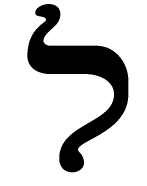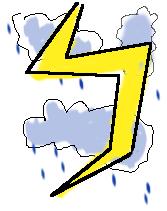Lamed

 doesn't look much like the letter L, but L actually came
from
doesn't look much like the letter L, but L actually came
from  , which is of course why they have the same sound.
We don't have too far to look to find a way to remember this one: the criss-cross shape of the letter reminds
me of lightning:
, which is of course why they have the same sound.
We don't have too far to look to find a way to remember this one: the criss-cross shape of the letter reminds
me of lightning:

Now let's try some reading practice again.
 (lecha) - to you (to a guy)
(lecha) - to you (to a guy)
 (lach) - to you (to a girl)
(lach) - to you (to a girl)
 (gal) - Means
wave.
(gal) - Means
wave.
 (lalah) - Means nothing whatsoever in Hebrew, although it's sort of an
English word in such linguistic staples as the phrase "lala-land."
(lalah) - Means nothing whatsoever in Hebrew, although it's sort of an
English word in such linguistic staples as the phrase "lala-land."
 (lailah, pronounced lie-lah) - Means
night.
(lailah, pronounced lie-lah) - Means
night.
 (luh) - Means "to."
(luh) - Means "to."
 (lo) - Means
his as in "his car," or
to him.
(lo) - Means
his as in "his car," or
to him.
 (lah) - Means
her as in "her car," or
to her.
(lah) - Means
her as in "her car," or
to her.
 (dai) - Enough! Pronounce it
like the word "die" but a bit sharper to emphasize the "eee" sound at the end. This can get confusing because if you frustrate an Israeli, often they'll tell
you to cool it by saying dai... which could be easily misinterpreted
by an English speaker! And they say many of the world's conflicts come from communication problems...
(dai) - Enough! Pronounce it
like the word "die" but a bit sharper to emphasize the "eee" sound at the end. This can get confusing because if you frustrate an Israeli, often they'll tell
you to cool it by saying dai... which could be easily misinterpreted
by an English speaker! And they say many of the world's conflicts come from communication problems...
 (chet) - sin. Usually translated
as "sin" but its real meaning is closer to "mistake" or "miss."
(chet) - sin. Usually translated
as "sin" but its real meaning is closer to "mistake" or "miss."
 (goy) - Nation,
people, or
gentile. Originally the word just meant "nation" but over time
in the sense of "other nations" it came to also mean a person who wasn't Jewish.
(goy) - Nation,
people, or
gentile. Originally the word just meant "nation" but over time
in the sense of "other nations" it came to also mean a person who wasn't Jewish.
Still following the K, L, M pattern we have Chaf/Kaf, Lamed, Mem...










































